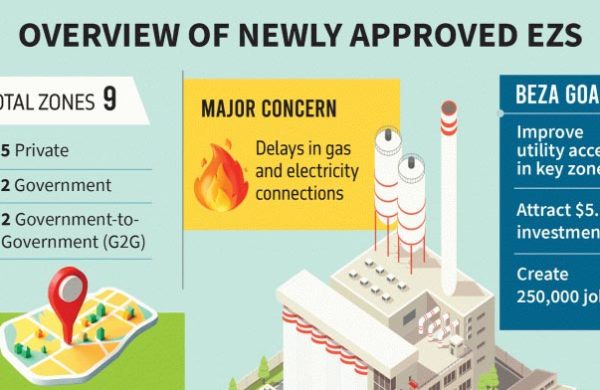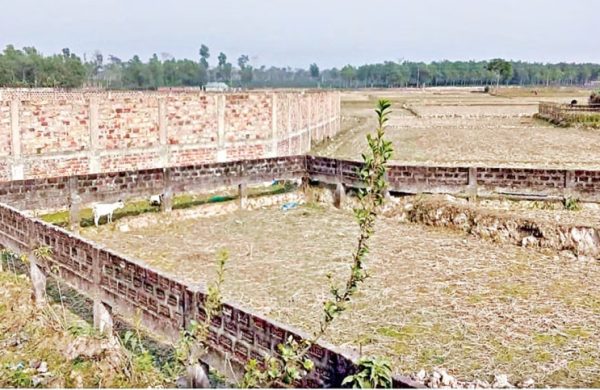9 economic zones receive approval amid gas supply concern
- Update Time : Saturday, May 10, 2025

Staff Correspondent:
The government has granted retroactive approval to nine new economic zones across the country, including two government zones, two government-to-government (G2G) zones, and five private zones.
However, entrepreneurs remain concerned that delays in gas and electricity connections—essential for starting operations—are holding back industrial activities.
The approval came at the 8th meeting of the Bangladesh Economic Zones Authority (Beza) Governing Board in April. Although these zones had previously received various levels of policy or preliminary approvals, they have now been formally recognised.
The total land area of the newly approved zones is approximately 4,574 acres.
Among the five private zones, Bhola Eco Development Economic Zone received policy approval on 4 July 2024 for 102 acres in Bhola Sadar and Daulatkhan. It will be developed by Chinese-owned Liz Fashion Industry Ltd.
Amanat Shah Special Economic Zone in Narsingdi Sadar received its preliminary qualification letter on 22 October 2024. Amanat Shah Group is developing the 36-acre site.
City Group’s Purbagaon Economic Zone in Rupganj upazila of Narayanganj covers 93 acres. It received policy approval in 2022 and final approval on 5 March 2024.
Meghna Group of Industries (MGI) secured retroactive approval for two zones in Meghna upazila of Cumilla.
Cumilla Economic Zone, on 360 acres, had already received its final licence in 2022. MGI plans to invest $2.5 billion and create 50,000 jobs there. Titas Economic Zone, covering 160 acres, received a preliminary qualification letter in 2023 and now has full approval.
For G2G zones, China will develop one on 3,037 acres in Chandpur, following a 2023 proposal submitted by its embassy to the Prime Minister’s Office.
Bhutan will set up a special economic zone on 200 acres in Kurigram, based on an agreement signed between the two governments on 25 March 2024.
The two government economic zones are Satkhira Economic Zone, approved in 2022 on 113 acres in Satkhira Sadar, and Rangpur Economic Zone (Kaunia), approved in January 2025 on 428 acres in Kaunia Sadar upazila.
INVESTORS FRUSTRATED BY UTILITY DELAYS
Some investors, including major groups, have waited years for gas and electricity after investing heavily in infrastructure.
Entrepreneurs warn that without timely access to utilities, the newly approved zones may struggle to attract or retain investment, despite the formal nods.
Beza Executive Chairman Chowdhury Ashik Mahmud Bin Harun acknowledged the concerns.
“In future, inter-ministerial meetings must be held before approving economic zones. Institutions providing services like gas and electricity must commit to delivering on time,” he said.
He added that zones will now be developed in phases, with attention to environmental and social factors, guided by ecological modernisation. No zone will be granted a pre-qualification licence without a feasibility study.
Beza said these approvals are part of its routine work. It remains in contact with the High Commissions of China, Bhutan, and Nepal, though it noted that finalising G2G zones can take time due to bilateral complexities. Private zones will move at their own pace.
STILL, FRUSTRATION IN THE PRIVATE SECTOR IS GROWING.
MGI Chairman Mostafa Kamal said at a 30 April event that despite investing $600 million in the Cumilla Economic Zone, they still lack electricity and gas.
“We are inviting foreign investment, but domestic entrepreneurs are suffering due to a fuel crisis. This must be taken seriously because electricity and gas are essential for investment,” he said.
Responding at a Chattogram event on Thursday, Beza’s executive chairman said, “Gas supply remains a significant issue. The energy adviser recently said gas supply to power generation will be reduced to favour industries, but this alone is not enough. We need to do much more.”
He added, “Unfortunately, I have investors ready, but the opportunity is not ready. We must try to overcome these problems as quickly as possible.”
To address the issue, the energy department has instructed distribution companies to provide new gas connections to export-oriented factories in planned industrial zones and increase supply to existing ones.
Petro Bangla and relevant agencies must also ensure proper gas pressure and cut system loss by half by June 2026 under a time-bound plan.
Earlier in January, Beza outlined a two-year plan to ensure water, gas, and electricity in five key zones: the National Special Economic Zone, Sylhet Economic Zone, Jamalpur Economic Zone, Maheshkhali Economic Zone, and Japanese Economic Zone.
The aim is to attract $5.5 billion in investment and create 250,000 jobs.
The executive chairman said a timeline-based approach will now guide approvals and service delivery across all private zones.


















